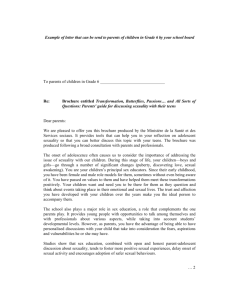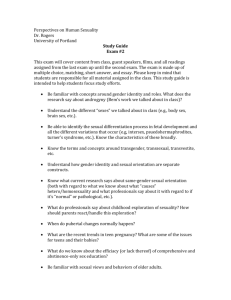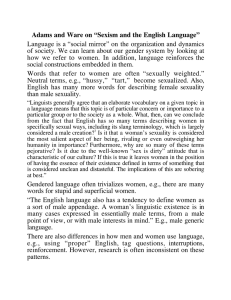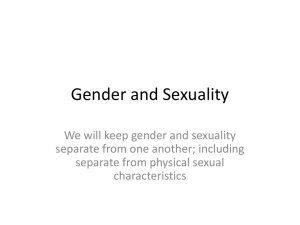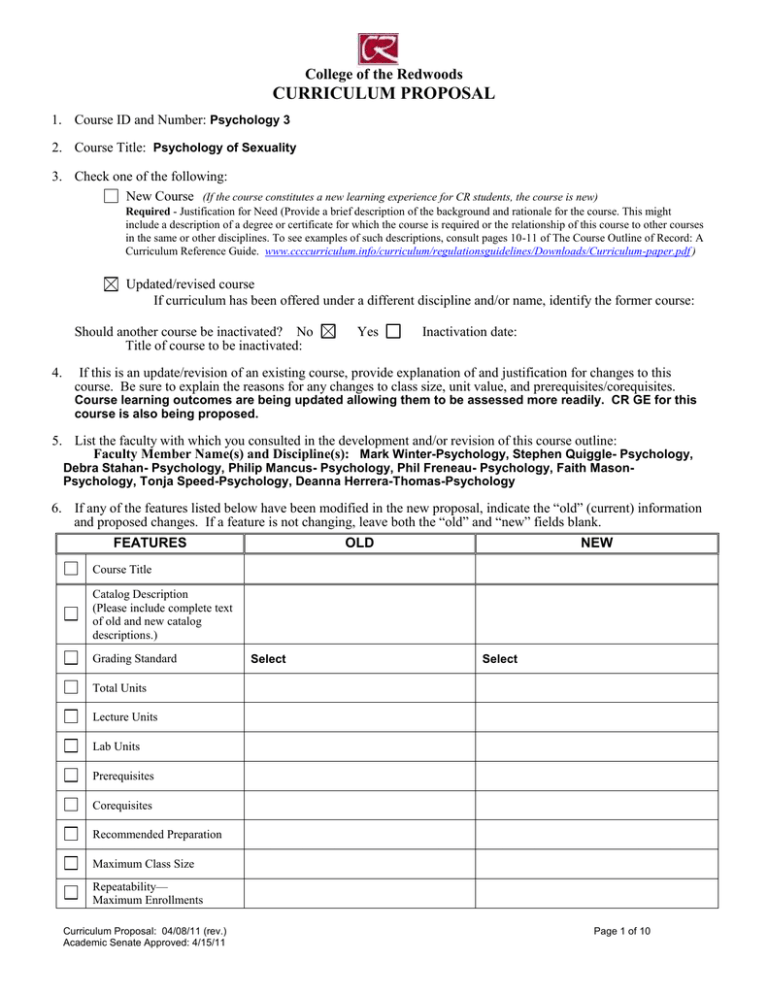
College of the Redwoods
CURRICULUM PROPOSAL
1. Course ID and Number: Psychology 3
2. Course Title: Psychology of Sexuality
3. Check one of the following:
New Course (If the course constitutes a new learning experience for CR students, the course is new)
Required - Justification for Need (Provide a brief description of the background and rationale for the course. This might
include a description of a degree or certificate for which the course is required or the relationship of this course to other courses
in the same or other disciplines. To see examples of such descriptions, consult pages 10-11 of The Course Outline of Record: A
Curriculum Reference Guide. www.ccccurriculum.info/curriculum/regulationsguidelines/Downloads/Curriculum-paper.pdf )
Updated/revised course
If curriculum has been offered under a different discipline and/or name, identify the former course:
Should another course be inactivated? No
Title of course to be inactivated:
4.
Yes
Inactivation date:
If this is an update/revision of an existing course, provide explanation of and justification for changes to this
course. Be sure to explain the reasons for any changes to class size, unit value, and prerequisites/corequisites.
Course learning outcomes are being updated allowing them to be assessed more readily. CR GE for this
course is also being proposed.
5. List the faculty with which you consulted in the development and/or revision of this course outline:
Faculty Member Name(s) and Discipline(s): Mark Winter-Psychology, Stephen Quiggle- Psychology,
Debra Stahan- Psychology, Philip Mancus- Psychology, Phil Freneau- Psychology, Faith MasonPsychology, Tonja Speed-Psychology, Deanna Herrera-Thomas-Psychology
6. If any of the features listed below have been modified in the new proposal, indicate the “old” (current) information
and proposed changes. If a feature is not changing, leave both the “old” and “new” fields blank.
FEATURES
OLD
NEW
Course Title
Catalog Description
(Please include complete text
of old and new catalog
descriptions.)
Grading Standard
Select
Select
Total Units
Lecture Units
Lab Units
Prerequisites
Corequisites
Recommended Preparation
Maximum Class Size
Repeatability—
Maximum Enrollments
Curriculum Proposal: 04/08/11 (rev.)
Academic Senate Approved: 4/15/11
Page 1 of 10
Other
Curriculum Proposal: 04/08/11 (rev.)
Academic Senate Approved: 4/15/11
CLO's and GE status being updated.
Page 2 of 10
College of the Redwoods
COURSE OUTLINE
1. DATE: 4/30/12
2. DIVISION: Arts, Languages, and Social Sciences
3. COURSE ID AND NUMBER: Psych 3
4. COURSE TITLE (appears in catalog and schedule of classes): Psychology of Sexuality
5. SHORT TITLE (appears on student transcripts; limited to 30 characters, including spaces): Psychology of Sexuality
6. LOCAL ID (TOPS): 200100 (Taxonomy of Program codes http://www.cccco.edu/Portals/4/TopTax6_rev0909.pdf)
7. NATIONAL ID (CIP): 42.0101 (Classification of Instructional Program codes can be found in Appendix B of the TOPS code book
http://www.cccco.edu/Portals/4/AA/CrosswalkTOP6to2010CIP.pdf)
8. Discipline(s): Select from CCC System Office Minimum Qualifications for Faculty
http://www.cccco.edu/Portals/4/AA/Minimum%20Qualifications%20Handbook%20for%202010-2012.pdf
Course may fit more than one discipline; identify all that apply: Psychology
9. FIRST TERM NEW OR REVISED COURSE MAY BE OFFERED: Fall 2012
10. TOTAL UNITS: 3
TOTAL HOURS: 54
[Lecture Units: 3 Lab Units: 0]
[Lecture Hours: 54 Lab Hours: 0]
(1 unit lecture=18 hours; 1 unit lab=54 hours)
11. MAXIMUM CLASS SIZE: 40
12. WILL THIS COURSE HAVE AN INSTRUCTIONAL MATERIALS FEE? No
Yes
Fee: $
(If “yes,” attach a completed “Instructional Materials Fee Request Form”—form available in Public Folders>Curriculum>Forms)
GRADING STANDARD
Letter Grade Only
Pass/No Pass Only
Is this course a repeatable lab course: No
Yes
Grade-Pass/No Pass Option
If yes, how many total enrollments?
Is this course to be offered as part of the Honors Program? No
Yes
If yes, explain how honors sections of the course are different from standard sections. Honors students may be a part
of this course either individually or as a complete section. They will be expected to write longer
versions of any assigned papers or projects, focusing to a greater degree on research within the field
of human sexuality study. Their analysis of topics will include a more in depth research assignment
that will focus upon research from scholarly sources. If students are individually taking an honors
credit they will be asked to complete presentations on topics to the class.
CATALOG DESCRIPTION -- The catalog description should clearly describe for students the scope of the course, its level, and what
kinds of student goals the course is designed to fulfill. The catalog description should begin with a sentence fragment.
A comprehensive study of sexuality with an emphasis on individual differences. The course includes a
study of sexual anatomy, sexual response, love and communication, sexual orientations, sexual
identities, sexually transmitted infections (STI's) as well as maturation and transitions throughout the
lifespan, sexual adaptations and disorders. The course is a scientific one and students are
encouraged to apply research findings to their own lives.
Special notes or advisories (e.g. field trips required, prior admission to special program required, etc.): This course
involves explicit discussions of sex and sexuality.
PREREQUISITE COURSE(S)
No
Yes
Course(s):
Curriculum Proposal: 04/08/11 (rev.)
Academic Senate Approved: 4/15/11
Page 3 of 10
Rationale for Prerequisite:
Describe representative skills without which the student would be highly unlikely to succeed .
COREQUISITE COURSE(S)
No
Yes
Course(s):
Rationale for Corequisite:
RECOMMENDED PREPARATION
No
Yes
Course(s): Eng 150
Rationale for Recommended Preparation: College reading and writing is required to be successful in this
course.
COURSE LEARNING OUTCOMES –This section answers the question “what will students be able to do as a result of
taking this course?” State some of the objectives in terms of specific, measurable student actions (e.g. discuss, identify,
describe, analyze, construct, compare, compose, display, report, select, etc.). For a more complete list of outcome verbs please
see Public Folders>Curriculum>Help Folder>SLO Language Chart. Each outcome should be numbered.
1. Analyze the interaction between environment, biology and learning in shaping sexual behavior.
2. Analyze current research in sexuality and synthesize information in writing.
3. Analyze how knowledge regarding types of love, communication, sexually transmitted infections
and contraception impacts relational choices, family planning and safer sex practices.
COURSE CONTENT–This section describes what the course is “about”-i.e. what it covers and what knowledge students will acquire
Concepts: What terms and ideas will students need to understand and be conversant with as they demonstrate course
outcomes? Each concept should be numbered.
1. Gender.
2. Sex.
3. Sexual norms.
4. Sexology.
5. Research methods.
6. Androgyny.
7. Sexual arousal and response cycle.
8. Sexual intelligence.
9. Sexual orientation.
10. Biopsychosocial perspective.
11. Perception.
12. Culture.
13. Sexual dysfuntions.
14. Neurochemical responses.
15. Communication.
16. Love.
17. Attraction.
18. Sexually transmitted infections.
19. Atypical sexual behavior.
20. Sex therapy.
21. Sexual coercion.
22. Classical conditioning.
Issues: What primary tensions or problems inherent in the subject matter of the course will students engage? Each issue
should be numbered.
1. Variability in constructions of gender.
2. The influence of cultural and religious diversity on personal behaviors.
3. Sexism, racism, homophobia, classism and their effects on healthy sexual identity development and
interactions with others.
4. Economic disparity and its differential effects upon sexual health.
5. Controversies regarding family planning and sex education.
6. How experience modifies perceptual interpretations of stimuli.
7. How individual and group communication is influenced by learning.
Curriculum Proposal: 04/08/11 (rev.)
Academic Senate Approved: 4/15/11
Page 4 of 10
Themes: What motifs, if any, are threaded throughout the course? Each theme should be numbered.
1. Sexual intelligence involves self understanding, interpersonal skills, scientific knowledge and
consideration of culture.
2. Biopsychosocial model - that sexuality is a combination of the biological, psychological and social
aspects of self.
3. Sexuality is in a process of development throughout the life span.
4. Sexuality is contextualized in diversity.
5. Sexuality is subjective.
Skills: What abilities must students have in order to demonstrate course outcomes? (E.g. write clearly, use a scientific
calculator, read college-level texts, create a field notebook, safely use power tools, etc). Each skill should be numbered.
1.
2.
3.
4.
5.
Critical reading of textbook and research articles
Analytical writing demonstrated in written assignments
Analyze and synthesize material presented in lecture, text and discussions
Employ a scientific sexuality vocabulary in classroom discussions and on tests
Participate in discussions of complex sexual issues
REPRESENTATIVE LEARNING ACTIVITIES –This section provides examples of things students may do to engage the
course content (e.g., listening to lectures, participating in discussions and/or group activities, attending a field trip). These
activities should relate directly to the Course Learning Outcomes. Each activity should be numbered.
1.
2.
3.
4.
Reading text
Listening to lectures and actively participating in discussions
Participating in collaborative learning with other students
Reflecting on material and applying course content to one's own psychosexual experience or
understanding
5. Responding in writing to questions about controversial topics in sexuality
6. Conducting library research
7. Presenting to the class
ASSESSMENT TASKS –This section describes assessments instructors may use to allow students opportunities to provide
evidence of achieving the Course Learning Outcomes. Each assessment should be numbered.
Representative assessment tasks (These are examples of assessments instructors could use):
1. Objective based quizzes and exams.
2. Periodic reading evaluations.
3. Group projects.
4. Presentations.
Required assessments for all sections (These are assessments that are required of all instructors of all sections at all
campuses/sites. Not all courses will have required assessments. Do not list here assessments that are listed as representative assessments
above.):
1. Quizzes and exams.
2. Writing assignment that includes scholarly research analysis.
EXAMPLES OF APPROPRIATE TEXTS OR OTHER READINGS –This section lists example texts, not required texts.
Author, Title, and Date Fields are required
Our Sexuality 11th ed.
Author Crooks
and Baur
Author Rathus,
Nevid & Fichner-Rathus
Author Yarber,
W.L., Strong, B., & Sayad, B.W
Date
Title
Title
Date
2010
Human Sexuality in a World of Diversity, 8th ed
Title
Date
2011
Human Sexuality: Diversity in Contemporary America
2010
Author
Title
Date
Other Appropriate Readings:
COURSE TYPES
1. Is the course part of a Chancellor’s Office approved CR Associate Degree?
No
Yes
If yes, specify all program codes that apply. (Codes can be found in Outlook/Public Folders/All Public Folders/ Curriculum/Degree
Curriculum Proposal: 04/08/11 (rev.)
Academic Senate Approved: 4/15/11
Page 5 of 10
and Certificate Programs/choose appropriate catalog year):
Required course for degree(s)
Restricted elective for degree (s)
Restricted electives are courses specifically listed (i.e. by name and number) as optional courses from which students
may choose to complete a specific number of units required for an approved degree.
2.
Is the course part of a Chancellor’s Office approved CR Certificate of Achievement?
No
Yes
If yes, specify all program codes that apply. ( Codes can be found in Outlook/Public Folders/All Public Folders/ Curriculum/Degree
and Certificate Programs/choose appropriate catalog year):
Required course for certificate(s)
Restricted elective for certificate(s)
Restricted electives are courses specifically listed (i.e. by name and number) as optional courses from which students may
choose to complete a specific number of units required for an approved certificate.
3.
Is the course Stand Alone?
No
Yes
(If “No” is checked for BOTH #1 & #2 above, the course is stand alone)
4.
Basic Skills: NBS Not Basic Skills
5.
Work Experience: NWE Not Coop Work Experience
6.
Course eligible Career Technical Education funding (applies to vocational and tech-prep courses only): yes
7.
Purpose: A Liberal Arts Sciences
8.
Accounting Method: W Weekly Census
9.
Disability Status: N Not a Special Class
no
CURRENT TRANSFERABILITY STATUS (Check at least one box below):
This course is currently transferable to
Neither CSU nor UC
CSU as general elective credit
CSU as a specific course equivalent (see below)
If the course transfers as a specific course equivalent, give course number(s)/ title(s) of one or more currently-active,
equivalent lower division courses from CSU.
1. Course
, Campus
2. Course
, Campus
UC as general elective credit
UC as specific course equivalent
If the course transfers as a specific course equivalent, give course number(s)/ title(s) of one or more currently-active,
equivalent lower division courses from UC.
1. Course
, Campus
2. Course
, Campus
PROPOSED CSU TRANSFERABILITY (Check at least one of the boxes below):
No proposal
Remove as General Education
Propose as General Elective Credit
Propose as a Specific Course Equivalent (see below)
If specific course equivalent credit is proposed, give course number(s)/ title(s) of one or more currently-active,
equivalent lower division courses from CSU.
1. Course HCSV 265, Campus Chico
2. Course HS 91, Campus Fresno
PROPOSED UC TRANSFERABILITY (Check one of the boxes below):
No proposal
Remove as General Education
Curriculum Proposal: 04/08/11 (rev.)
Academic Senate Approved: 4/15/11
Page 6 of 10
Propose as General Elective Credit OR Specific Course Equivalent (fill in information below)
If “General Elective Credit OR Specific Course Equivalent” box above is checked, give course number(s)/ title(s) of one
or more currently-active, equivalent lower division courses from UC.
1. Course HDE 012, Campus Davis 2. Course Psych 80B, Campus Santa Cruz
Curriculum Proposal: 04/08/11 (rev.)
Academic Senate Approved: 4/15/11
Page 7 of 10
CURRENTLY APPROVED GENERAL EDUCATION Check at least one box below):
Not currently approved
CR
CR GE Category:
CSU
CSU GE Category:
IGETC
IGETC Category:
PROPOSED CR GENERAL EDUCATION (Check at least one box below):
No proposal
_X__ Approved as CR GE by Curriculum Committee:_05.11.12_
Remove as General Education
(DATE)
Review to maintain CR GE Status
____ Not approved.
New GE Proposal
CR GE Outcomes
GE learning outcomes in Effective Communication, Critical Thinking, Global Awareness must be addressed in all general
education courses.
Effective Communications: Explain how the proposed GE course fulfills at least one of the CR GE outcomes in this
category. This course encourages students to critically think, read and communicate about issues that
are relevant to their participation in their communities. They will be conducting library research,
analyzing research in the field of sexuality and providing written work that evaluates and synthesizes
this research. They will be communicating with others in the classroom on issues related to sexuality
while utilizing appropriate definitions and terms. This course provides students with information that
allows them to make informed decisions that affect relational and physical health, and communicate
their needs and decisions to others.
Critical Thinking: Explain how the proposed GE course fulfills at least one of the CR GE outcomes in this category.
They will be asked to critically analyze the research presented in the text and in class. This analysis
will include extracting relevant data and formulating research questions. Students are asked in this
class to critically anaylze behavior in the a biopsychosocial framework.
Global Awareness: Explain how the proposed GE course fulfills at least one of the CR GE outcomes in this category.
The content of this course focuses on individuals’ differences in sexuality. Throughout the course,
students discuss how individuals are affected by the cultural and social context in which they live.
Students discuss the effects of religion, media, and societal roles on individuals.
GE Criteria for Breadth and Generality
GE courses should be broad and general in scope. Typically such courses are introductory-- not advanced or specialized—and
the content encompasses a broad spectrum of knowledge within a given field of study.
Explain how the proposed GE course fulfills GE criteria for breadth and generality. This course is an overview of
sexuality in Psychology.
CR GE Area Designation
Course Learning Outcomes and Course Content should provide evidence of appropriate GE Area Designation.
Additional rationale for GE Area Designation (optional):
Natural Science
Social Science
Humanities
Language and Rationality
Writing
Oral Communications
Analytical Thinking
PROPOSED CSU GENERAL EDUCATION BREADTH (CSU GE) (Check at least one box below):
No proposal
A. Communications and Critical Thinking
A1 – Oral Communication
A2 – Written Communication
A3 – Critical Thinking
C. Arts, Literature, Philosophy, and Foreign Language
Curriculum Proposal: 04/08/11 (rev.)
Academic Senate Approved: 4/15/11
B. Science and Math
B1 – Physical Science
B2 – Life Science
B3 – Laboratory Activity
B4 – Mathematics/Quantitative Reasoning
D. Social, Political, and Economic Institutions
Page 8 of 10
C1 – Arts (Art, Dance, Music, Theater)
C2 – Humanities (Literature, Philosophy, Foreign
Language)
E. Lifelong Understanding and Self-Development
E1 – Lifelong Understanding
E2 – Self-Development
D0 – Sociology and Criminology
D1 – Anthropology and Archeology
D2 – Economics
D3 – Ethnic Studies
D5 – Geography
D6 – History
D7 – Interdisciplinary Social or Behavioral Science
D8 – Political Science, Government and Legal Institutions
D9 – Psychology
Rationale for inclusion in this General Education category: Same as above
Curriculum Proposal: 04/08/11 (rev.)
Academic Senate Approved: 4/15/11
Page 9 of 10
Proposed Intersegmental General Education Transfer Curriculum (IGETC) (Check at least one box below ):
No proposal
1A – English Composition
1B – Critical Thinking-English Composition
1C – Oral Communication (CSU requirement only)
2A – Math
3A – Arts
3B – Humanities
4A – Anthropology and Archaeology
4B – Economics
4E – Geography
4F – History
4G – Interdisciplinary, Social & Behavioral Sciences
4H – Political Science, Government & Legal Institutions
4I – Psychology
4J – Sociology & Criminology
5A – Physical Science
5B – Biological Science
6A – Languages Other Than English
Rationale for inclusion in this General Education category:
Same as above
Submitted by: Michelle Woods Haggerty
Division Chair/Director: Rachel Anderson
Approved by Curriculum Committee: No
Academic Senate Approval Date: 5.17.12
Curriculum Proposal: 04/08/11 (rev.)
Academic Senate Approved: 4/15/11
Tel. Ext.
4319
Review Date: 5/4/12
Date: 4/30/12
CURRICULUM COMMITTEE USE ONLY
Yes
Date: 05.11.12
Board of Trustees Approval Date: 6.5.12
Page 10 of 10




